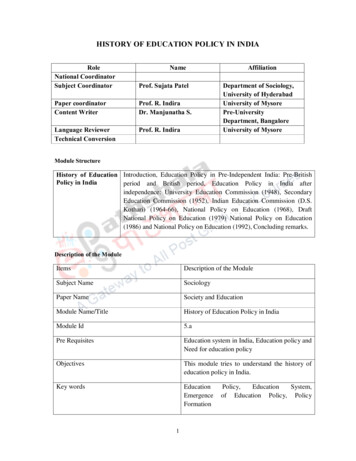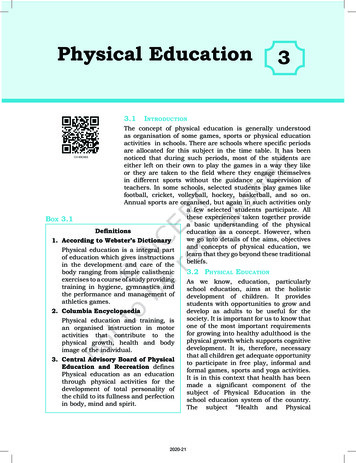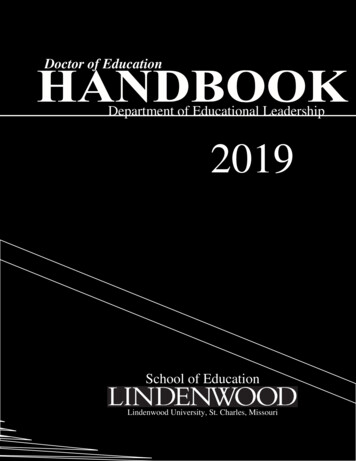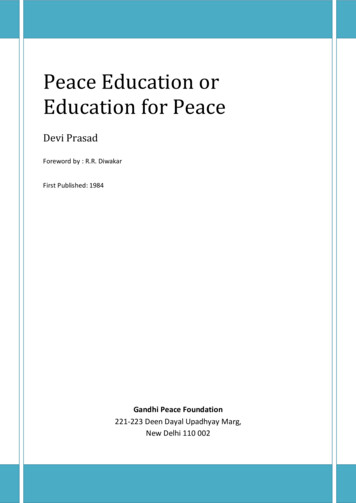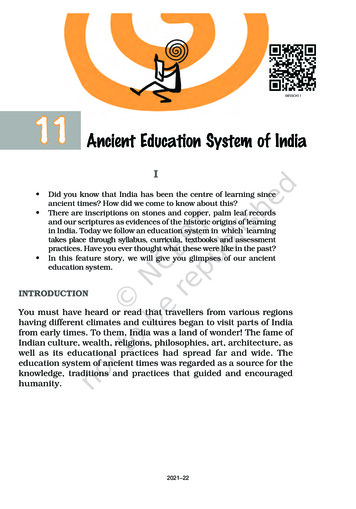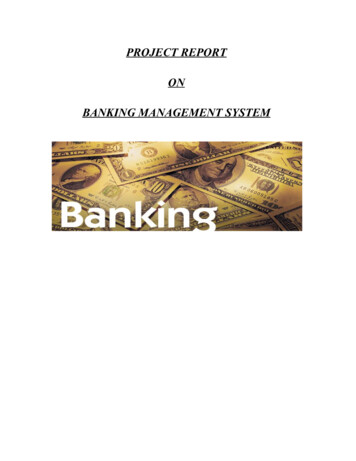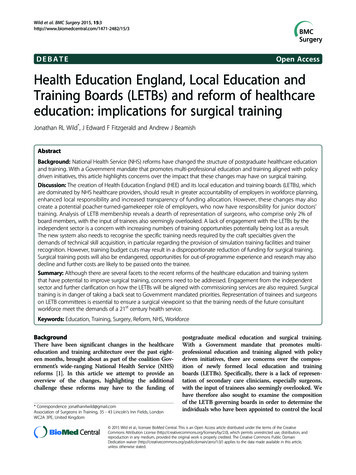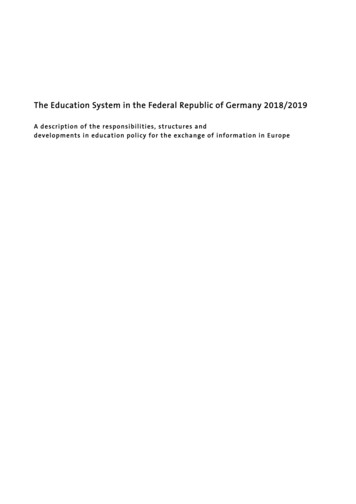
Transcription
The Education System in the Federal Republic of Germany 2018/2019A d e scri p ti o n o f th e re sp o nsi b i l i ti es, s tr uc tu r es a ndd ev el o p m e nt s i n ed u ca ti o n p o l i cy f o r t h e ex cha ng e o f i nf o rma ti o n i n E u ro p e
Published by:Secretariat of the Standing Conference of the Ministers of Education andCultural Affairs of the Länder in the Federal Republic of GermanyTaubenstr. 10, 10117 BerlinEdited by:T HOMAS ECKHARDTDivision IVB – European and Multilateral AffairsGerman EURYDICE Unit of the Länder in the Secretariat of the Standing Conference of theMinisters of Education and Cultural Affairs of the Länder in the Federal Republic of Germanyin cooperation with theGerman EURYDICE Unit of the Federal Government in theFederal Ministry of Education and ResearchEditorial deadline of the original version: October 2019 KMK, Bonn 2021
PREFACE BY THE EDITORThe Secretariat of the Standing Conference of the Ministers of Education and Cultural Affairsis herewith presenting the NATIONAL DOSSIER for Germany as a contribution to the better mutual understanding of the education systems in Europe. The Dossier describes the responsibilities, structures and key developments in educational policy up to the middle of 2019.The discussion on education policy in Germany continues to revolve around further development and quality assurance measures with respect to school education and around improving comparability and mobility. The introduction of educational standards binding forall Länder and the establishment of the Institute for Educational Quality Improvement (Institut zur Qualitätsentwicklung im Bildungswesen – IQB) to review and develop them markedthe beginning of a paradigm shift towards an output-oriented control of the education system. In 2019, the results of the second review of the educational standards of the StandingConference in the subjects of mathematics, biology, chemistry and physics at lower secondary level were published in a comparison between the Länder.With the resolution of educational standards for the Allgemeine Hochschulreife (generalhigher education entrance qualification) and the establishment of a pool of Abitur examination tasks in the subjects German, mathematics and advanced foreign languages that is common for all Länder, the Länder community now also guarantees the comparability and highquality of the Abitur tasks. The educational standards have formed the basis of subject-specific requirements for the Allgemeine Hochschulreife since the beginning of the 2014/2015school year and apply for the Abitur examinations since the 2016/2017 school year.In December 2016, the Standing Conference adopted the "Education in the Digital World"strategy against the backdrop of the opportunities and challenges posed by the ongoing digitalization of all areas of life. The strategy formulates clear goals for digital education inschools and higher education institutions and defines the orientation of educational content.In the school sector, teaching and learning in the digital world must follow the primacy ofpedagogy, i.e. the educational mission. In the period under review, the "Education in the Digital World" strategy was supplemented by recommendations on digitisation in higher education teaching. The recommendations are addressed to the federal and Länder governments,as well as to administrations of higher education institutions, faculties and departments,and teachers themselves. They are to be understood as impulses and suggestions for shapingthe digital transformation in all areas of higher education and across higher education institutions and for making profitable use of it.Another key topic in 2019 was the strengthening of formal language skills. With the recommendation "Strengthening formal language skills in the German language", the StandingConference presented common principles for language education and language support forschool work across the Länder. Since formal language competencies contribute, among otherthings, to integral personality development, world and value orientation, and individual talent development, they should be strengthened in all stages of education and in all subjects,learning areas, and learning fields. This is a universal teaching principle in all subjects, learning areas and learning fields and a cross-sectional task of all those involved in school education.The National Dossier for Germany provides an overview ranging from early childhood toadult education, as well as offering background information on the basic political and economic conditions in Germany. As this dossier serves the purposes of the exchange of information in Europe, the focus is initially on the common features of the education systems inthe 16 Länder. However, in order to give the reader a picture of the variety of educationalprogrammes in Germany, the features unique to each individual Land are also included inthe description.
The National Dossier has been drawn up each year since 1993 as part of the Information Network on Education in Europe (EURYDICE) on the basis of a common structure for all states.The complete texts of each National Dossier are available online in English, and partly alsoin the national language(s) of the country or region concerned, on the EURYDICE-Website.The website allows Europe-wide comparisons of individual aspects of the education systemsin the 37 countries participating in the activities of the EURYDICE information network.Work on the German Dossier was completed following consultation and agreement with theFederal Government and the Länder. The work was performed by the Eurydice InformationUnit of the Länder which is established within the Division for European and MultilateralAffairs of the Secretariat of the Standing Conference of the Ministers of Education and Cultural Affairs. The Dossier is supplemented by references concerning the basic legal regulations of the Federal Government and the Länder, a list of institutions and a bibliography, aswell as by a glossary of national terms and the special technical terminology used.In accordance with the function of the national dossiers, the annual report for 2018/2019contains a reliable presentation of the German education system completed in consultationwith the ministries responsible for education. In this regard, the dossier supplements thereporting on education based on statistical indicators and serves Germany as basic documentation and reference source on the federal education system for international contacts andconsultations at European level. Furthermore, the National Dossier, being an up-to-date assessment of responsibilities, structures and developments in the German education system,addresses all interested readers in Germany and abroad.Udo MichallikSecretary General of the Standing Conferenceof the Ministers of Education and Cultural Affairs
PREFACE BY THE FEDERAL MINISTRY OF EDUCATION AND RESEARCHEurope and the world are in a constant state of change. Our time is characterized by manyuncertainties and major upheavals. The way in which the European community of states approaches the current challenges is increasingly helping to determine the future of the European Union. Against this background, cooperation between the European states is essential.In order to remain strong as Europe and to be able to respond to current challenges with confidence, it is more important than ever to constantly improve our education systems. To thisend, we need to exchange ideas with our European partner countries and learn from eachother.The European Union supports this process through the education network Eurydice, whichconsists of national agencies in 37 European countries and the European Education and Culture Executive Agency in Brussels (EACEA). Eurydice collects information on the educationsystems of the states of Europe as well as on current political education initiatives and prepares them in a descriptive way. In this way, Eurydice not only provides an overview of theindividual education systems, but also produces comparable reports that facilitate the exchange of information and experience. This creates a sound knowledge base that policy makers at national and European level can use to address new and old challenges.The Eurydice publication "The Education System in the Federal Republic of Germany2018/19" presents a detailed description of the German education system and current policyprojects. The report, prepared jointly for Eurydice by the Federal Government and the Länder,covers all educational sectors and levels, as well as current reform initiatives.Each member state of the Eurydice network produces such an overview of its own educationsystem. Since the publications are structured in the same way, they allow for transparencyand good comparability. All parts of the respective education systems can also be looked upin individual chapters in Eurydice's online encyclopedia.Susanne BurgerDirector General for European andInternational Cooperation in Education and ResearchFederal Ministry of Education and Research
4.4.4.5.4.6.4.7.4.8.5.5.1.5.2.5.3.5.4.POLITICAL, SOCIAL AND ECONOMIC BACKGROUND AND TRENDS11IntroductionHistorical DevelopmentMain Executive and Legislative BodiesPopulation: Demographic Situation, Languages and ReligionsPolitical and Economic Situation1111121621ORGANISATION AND GOVERNANCE23IntroductionFundamental Principles and National PoliciesLifelong Learning StrategyOrganisation of the Education System and of Its StructureOrganisation of Private EducationNational Qualifications FrameworkAdministration and Governance at Central and/or Regional LevelAdministration and Governance at Local and/or Institutional LevelStatistics on Organisation and arly Childhood and School Education FundingHigher Education FundingAdult Education and Training Funding81828998EARLY CHILDHOOD EDUCATION AND CARE103IntroductionOrganisation of Programmes for Children under 2-3 YearsTeaching and Learning in Programmes for Children under 2-3 YearsAssessment in Programmes for Children under 2-3 YearsOrganisation of Programmes for Children over 2-3 YearsTeaching and Learning in Programmes for Children over 2-3 YearsAssessment in Programmes for Children over 2-3 YearsOrganisational Variations and Alternative Structures in Early ChildhoodEducation and Care103104105106106107108PRIMARY EDUCATION111IntroductionOrganisation of Primary EducationTeaching and Learning in Primary EducationAssessment in Primary Education1111111161191087
nisational Variations and Alternative Structures in Primary Education121SECONDARY AND POST-SECONDARY NON-TERTIARY EDUCATION123IntroductionOrganisation of General Lower Secondary EducationTeaching and Learning in General Lower Secondary EducationAssessment in General Lower Secondary EducationOther organisational models and alternative structuresOrganisation of General Upper Secondary EducationTeaching and Learning in General Upper Secondary EducationAssessment in General Upper Secondary EducationOther organisational models and alternative structuresOrganisation of Vocational Upper Secondary EducationTeaching and Learning in Vocational Upper Secondary EducationAssessment in Vocational Upper Secondary EducationOther organisational models and alternative structuresPost-Secondary Non-Tertiary 7HIGHER EDUCATION159IntroductionTypes of Higher Education InstitutionsFirst Cycle Programmes159160162BachelorShort-Cycle Higher Education162181Second Cycle ProgrammesProgrammes Outside the Bachelor and Master StructureThird Cycle (PhD) Programmes181183185ADULT EDUCATION AND TRAINING187IntroductionDistribution of ResponsibilitiesDevelopments and Current Policy PrioritiesMain ProvidersMain Types of ProvisionValidation of Non-formal and Informal Learning187187189190191195TEACHERS AND EDUCATION STAFF197IntroductionInitial Education for Teachers Working in Early Childhood andSchool EducationConditions of Service for Teachers Working in Early Childhood and SchoolEducation197197208
ing Professional Development for Teachers Working inEarly Childhood and School EducationInitial Education for Academic Staff in Higher EducationConditions of Service for Academic Staff Working in Higher EducationContinuing Professional Development for Academic Staff Working inHigher EducationInitial Education for Teachers and Trainers Working in AdultEducation and TrainingConditions of Service for Teachers and Trainers Working in AdultEducation and TrainingContinuing Professional Development for Teachers and TrainersWorking in Adult Education and Training219223224228228228228MANAGEMENT AND OTHER EDUCATION STAFF229Management Staff for Early Childhood and School EducationStaff Involved in Monitoring Educational Quality in Early Childhoodand School EducationEducation Staff Responsible for Guidance in Early Childhood andSchool EducationOther Education Staff or Staff Working with SchoolsManagement Staff for Higher EducationOther Education Staff or Staff Working in Higher EducationManagement Staff Working in Adult Education and TrainingOther Education Staff or Staff Working in Adult Education and Training229230230231233233233233QUALITY ASSURANCE235IntroductionQuality Assurance in Early Childhood and School EducationQuality Assurance in Higher EducationQuality Assurance in Adult Education and Training235237251257EDUCATIONAL SUPPORT AND GUIDANCE261IntroductionSpecial Education Needs Provision within Mainstream Education in theElementary Sector and the School SectorSeparate Special Education Needs Provision in Early Childhood andSchool EducationSupport Measures for Learners in Early Childhood and School EducationGuidance and Counselling in Early Childhood and School EducationSupport Measures for Learners in Higher EducationGuidance and Counselling in Higher EducationSupport Measures for Learners in Adult Education and TrainingGuidance and Counselling in a Lifelong Learning Approach2612632652672772812832862869
.14.2.14.3.14.4.14.5.14.6.MOBILITY AND INTERNATIONALISATION287IntroductionMobility in Early Childhood and School EducationMobility in Higher EducationMobility in Adult EducationOther Dimensions of Internationalisation in Early Childhood andSchool EducationOther Dimensions of Internationalisation in Higher EducationOther Dimensions of Internationalisation in Adult Education and TrainingBilateral Agreements and Worldwide Cooperation287288293298ONGOING REFORMS AND POLICY DEVELOPMENTS313National Reforms in Early Childhood Education and CareNational Reforms in School EducationNational Reforms in Vocational Education and Training and Adult LearningNational Reforms in Higher EducationNational Reforms Related to Transversal Skills and EmployabilityEuropean y37910
1.1.1.POLITICAL, SOCIAL AND ECONOMIC BACKGROUND AND TRENDSIntroductionThe Federal Republic of Germany lies at the heart of Europe and is surrounded by nineneighbouring states. The territory covers around 357,000 km2 and stretches from theNorth and Baltic Seas in the north to the Alps in the south. Germany has 82.8 millioninhabitants, making it the most populous state in the European Union (EU). Morethan 19 million inhabitants have a migrant background, over 9 million of these areforeign nationals and over 9.8 million have German citizenship. The national and official language is German. Special rulings exist in Brandenburg and Sachsen for theuse of the Sorbian (Wendish) language.The Federal Republic of Germany has been a democratic and social federation since1949. The Länder formed in 1946 in the west built on the federalism of the GermanEmpire (1871-1918) and the Weimar Republic (1919-33) in constitutional terms. TheGrundgesetz of 1949 (Basic Law – R1) stipulates that the traditional federal order becontinued in the areas of education, science and culture. Thus, the primary responsibility for legislation and administration in the above-mentioned areas, so-called cultural sovereignty (Kulturhoheit), rests with the Länder. The federalist principle is anacknowledgement of the regional structure which has evolved through Germany'shistory and is an element in the division of power and also, in a democratic state, aguarantee of diversity, competition and community-based politics. In addition to thefederal principle, the education system in the Federal Republic of Germany is characterised by ideological and social pluralism.A decisive factor in the development of the German education system in a similardirection as from 1945 on was the cooperation of the Länder in the Kultusministerkonferenz (KMK), or Standing Conference of the Ministers of Education and CulturalAffairs of the Länder in the Federal Republic of Germany, which was founded in 1948.The Unification Treaty of 1990 (Einigungsvertrag – R2) between the Federal Republicof Germany and the German Democratic Republic required the five Länder in easternGermany to lay the legislative foundations for the reorganisation of education by 30June 1991. Under the Establishment of Länder Act (Ländereinführungsgesetz – R3) ofJuly 1990, the five Länder in eastern Germany set up their own Ministries of Education, Cultural Affairs and Science which joined the Standing Conference of the Ministers of Education and Cultural Affairs in December 1990 with a view to introducinga common and comparable basic structure in the education system by way of the selfcoordination of the Länder in the Federal Republic.1.2.Historical DevelopmentFollowing the end of the Second World War in 1945, Germany was divided into American, British, Soviet and French zones of occupation and placed under the control ofthe four powers. No agreement could be reached between the three Western powersand the Soviet Union on a common political and social structure for Germany. Therefore, in the three Western zones of occupation the Federal Republic of Germany, ademocratic and social federal state, was created in May 1949 with the promulgationof the Basic Law (Grundgesetz – R1), whilst in the Soviet zone of occupation, the German Democratic Republic (GDR) was established in October 1949. The accession ofthe new Länder on the former territory of the GDR to the Federal Republic of Germanyon 3 October 1990 marked the end of over forty years of division and the restoration11
of a unified German state. The changes in the Soviet Union and the upheaval in thecountries of eastern and central Europe had helped to create the political climate forGerman unity.Since 1990, the Federal Republic of Germany has been made up of 16 Länder: BadenWürttemberg, Bayern, Berlin, Brandenburg, Bremen, Hamburg, Hessen, Mecklenburg-Vorpommern, Niedersachsen, Nordrhein-Westfalen, Rheinland-Pfalz, Saarland,Sachsen, Sachsen-Anhalt, Schleswig-Holstein and Thüringen.Germany was involved in the process of European integration from the very outset.In the year 1957, Germany signed the Treaty of Rome together with Belgium, France,Luxembourg, Italy and the Netherlands. Germany is a founding member of the European Union.In order to bring about German unity in the areas of culture, education and science,the Unification Treaty (Einigungsvertrag – R2) concluded between the Federal Republic of Germany and the GDR on 31 August 1990 contains fundamental provisionswhich aim to establish a common and comparable basic structure in education – particularly in the school system – and a common, though differentiated, higher education and research landscape in the Federal Republic of Germany.The unification of the two German states in October 1990 changed the party politicalscene in that new or altered political groupings emerged after the peaceful revolutionin the GDR in November 1989. A wider political spectrum thus came into being inGermany as reflected in the distribution of seats in the German Bundestag after theeight sets of all-German elections: the Christian Democratic Union of Germany (CDU),the Social Democratic Party of Germany (SPD), the Alternative for Germany (AfD), theFree Democratic Party (FDP), the Left Party, the Alliance 90/Greens and the ChristianSocial Union (CSU).Basic background information on Germany can be found in the handbook Facts aboutGermany (www.tatsachen-ueber-deutschland.de) published by the Federal ForeignOffice (Auswärtiges Amt).1.3.Main Executive and Legislative BodiesConstitutional groundworkThe constitution of the Federal Republic of Germany, known as the Grundgesetz (BasicLaw – R1), was adopted in 1949 to cement a political system based on freedom anddemocracy. In its preamble, the German people was called on to achieve in free self-determination the unity and freedom of Germany.This came true in 1990. Following the conclusion on 31 August 1990 of the Unification Treaty (Einigungsvertrag – R2) setting out the modalities for the German Democratic Republic's (GDR) accession to the Federal Republic, the preamble and concluding article of the Basic Law were revised. The text of the constitution now reflects thefact that, with the accession of the GDR, the Germans have regained their unity. Since3 October 1990 the Basic Law is binding on the whole German nation.The Basic Law states that the Federal Republic of Germany is a democratic and socialfederal state (Art. 20). All public authority emanates from the people. It is exercisedby the people through elections and referendums and by specific legislative, executive and judicial bodies. The legislature is bound by the constitutional order, the12
executive and the judiciary by laws and justice. This applies both to the Federationand the Länder.The exercise of governmental powers and the discharge of governmental functionsare divided by the Basic Law (Art. 30) between the Federation and the Länder. Exceptas otherwise provided or permitted by the Basic Law these are incumbent on the Länder. At federal level, legislative functions are essentially discharged by the GermanBundestag and executive functions are essentially executed by the Federal Government. At the level of the Länder they are discharged by the Land parliaments and theLand governments respectively.Functions of the judiciary are exercised by the Bundesverfassungsgericht (Federal Constitutional Court), other federal courts and the courts of the Länder (Art. 92 of theBasic Law). The Federal Constitutional Court rules on interpretation of the Basic Lawin particular.The Federal PresidentThe Federal President (Bundespräsident) is the head of state of the Federal Republic ofGermany. He is elected by the Federal Convention (Bundesversammlung) for a periodof five years (Art. 54 of the Basic Law). The Federal Convention is a constitutionalbody which meets only to elect the Federal President. It is made up of members of theBundestag as well as the same number of delegates elected by the parliaments of theLänder. The Federal President represents the Federal Republic of Germany in its international relations. He concludes treaties with foreign countries on behalf of theFederation, while the actual conduct of foreign policy is the prerogative of the FederalGovernment.The present incumbent is Frank-Walter Steinmeier who entered office in February 2017.The BundestagThe Bundestag is the parliamentary assembly representing the people of the FederalRepublic of Germany. After the elections to the German Bundestag in September 2017, the assembly currently features 709 seats. The members of the Bundestagare elected by secret ballot at general, direct, free and equal elections for a term offour years (Art. 38 of the Basic Law). The main functions of the Bundestag are to adoptlegislation, elect the Federal Chancellor and monitor and control the activities of theFederal Government. The Bundestag has formed committees for specific subject areas. Education and research are dealt with by the Committee on Education, Researchand Technology Assessment. Most of the bills submitted to parliament for its consideration come from the Federal Government, while a smaller number are introducedfrom the floor of the Bundestag itself or by the Bundesrat, the representative body ofmembers of the Länder governments.The BundesratThe Bundesrat, the representative body of the 16 Länder, is also involved in legislation and federal administration as well as in issues of the European Union (Art. 50 ofthe Basic Law). The Bundesrat is composed of members of government in the Länder.Each of the Länder has between three and six votes depending on their population,although the votes of one Land cannot be split. The smallest of the 16 Länder havethree votes, those with a population over two and up to six million inhabitants have13
four votes, while Länder with a population over six million are entitled to cast fivevotes and those with a population over seven million may cast six votes of the totalof 69 votes. A considerable part of all federal legislation is subject to the approval ofthe Bundesrat. Legislation requires such approval particularly when it refers to thefinances or the administrative authority of the Länder.Of the Bundesrat's 16 committees, the Cultural Affairs Committee, the Internal Affairs Committee and the Committee for European Union Issues are the main committees responsible for science and education. For urgent cases the Bundesrat has a Europe Chamber, which can quickly take decisions on EU legislative proposals (Art. 52,Paragraph 3a of the Basic Law). The Länder rights of participation in European Unionaffairs are laid down in Article 23 of the Basic Law and set out in detail in the Act onCooperation between the Federation and the Länder in European Union Affairs (Gesetz über die Zusammenarbeit von Bund und Ländern in Angelegenheiten der Europäischen Union – EUZBLG – R10) adopted in 1993. The rights and obligations of participation of the Länder provided for in said Law are exercised through the Bundesrat.The nature and scope of such rights and duties are based on the internal assignmentof responsibilities between the Federation and the Länder. When legislative powersexclusive to the Länder in school education, culture or broadcasting are primarily affected, the exercise of the rights belonging to the Federal Republic of Germany as amember state of the European Union is delegated to a representative of the Länderdesignated by the Bundesrat.The Federal GovernmentThe Federal Government is comprised of the Federal Chancellor and the Federal Ministers. The Federal Chancellor enjoys an autonomous, eminent position within theFederal Government and with regard to the Federal Ministers. He makes proposals tothe Federal President on the appointment and removal of ministers (Art. 64 of theBasic Law) and directs the affairs of the Federal Government. The strong position ofthe Federal Chancellor is based first and foremost on his power to determine generalpolicy guidelines as enshrined in Article 65 of the Basic Law: The Federal Chancellorsets out general policy guidelines and is responsible for them.The present incumbent, ANGELA M ERKEL (Christian Democratic Union), has been in office as Federal Chancellor since November 2005. After the general elections in September 2017, the Bundestag elected her Federal Chancellor for a further four years inMarch 2018.Within the Federal Government, it is the Federal Ministry of Education and Research(Bundesministerium für Bildung und Forschung – BMBF), that is responsible for policy,coordination and legislation regarding out-of-school vocational training and continuing education, financial assistance for pupils and students, as well as for the admission to higher education institutions and the degrees they confer. Furthermore, theFederal Ministry of Education and Research exercises the responsibilities of the Federation as part of the joint tasks of the Federation and the Länder (Art. 91b of the BasicLaw). For more detailed information on the responsibilities of the BMBF, see chapter 2.7. Other Federal ministries are also involved, as they are responsible for certainaspects of education and science. As of 2019, these ministries are: 14the Federal Foreign Office is responsible for Foreign Cultural Policy includingGerman schools abroad
the Federal Ministry of the Interior, Building and Community is responsiblefor the legislation on the status-related rights and duties of the civil servantsof the Länder, which include most teachersthe Federal Ministry of Justice and Consumer Protection is responsible forthe legislation on entry to the legal professionthe Federal Ministry of Labour and Social Affairs is responsible for measuresto promote employment and for occupational and labour market researchthe Federal Ministry for Family Affairs, Senior Citizens, Women and Youth isresponsible for child and youth welfarethe Federal Ministry of Health is responsible for regulations on entry to themedical and paramedical professionsand the Federal Ministry for Economic Cooperation and Development is responsible for international continuing education and developmentThe Federal Constitutional CourtBased in Karlsruhe, the Federal Constitutional Court (Bundesverfassungsgericht) is responsible for monitoring compliance with the Basic Law. It examines legislation enacted at federal and Land level to ensure that it is compatible with the Basic Law. Anycitizen of the Federal Republic has the right to file a complaint with the Federal Const
4.3. Teaching and Learning in Programmes for Children under 2-3 Years 105 4.4. Assessment in Programmes for Children under 2-3 Years 106 4.5. Organisation of Programmes for Children over 2-3 Years 106 4.6. Teaching and Learning in Programmes for Children over 2-3 Years 107 4.7. Assessment in Programmes for Children over 2-3 Years 108 4.8.




